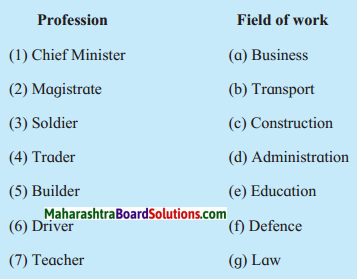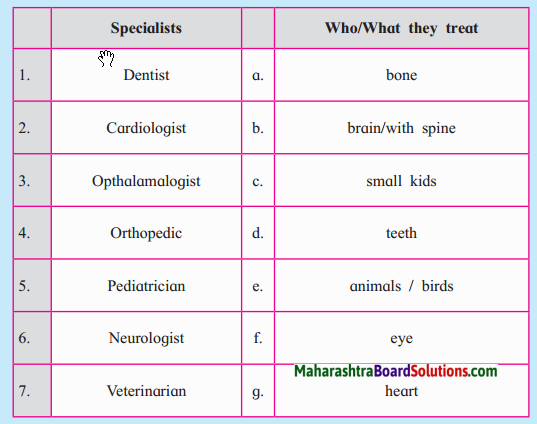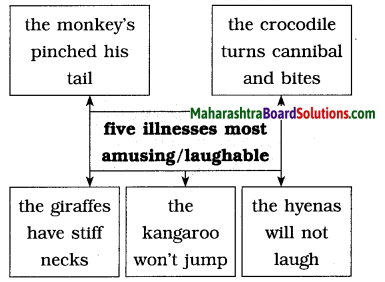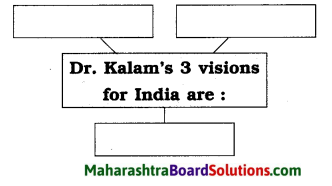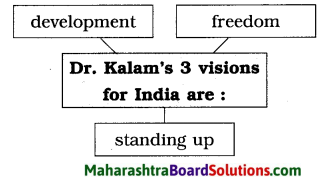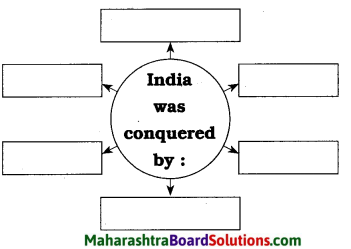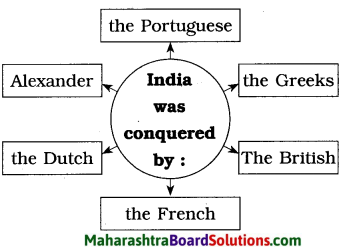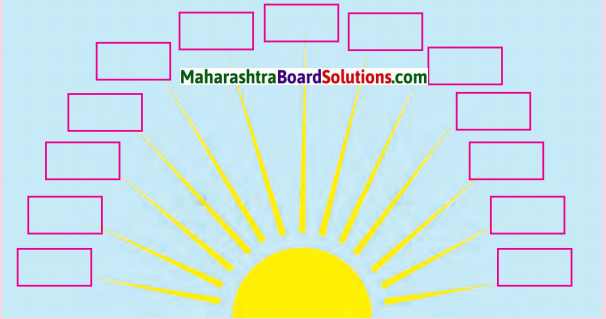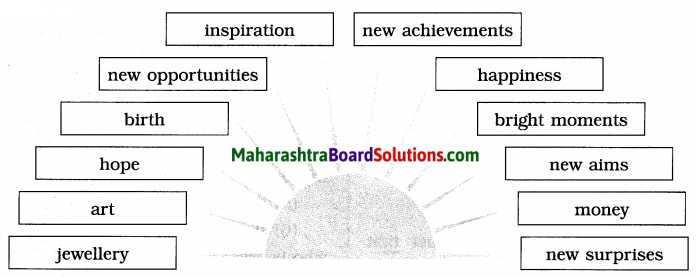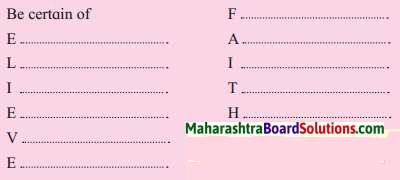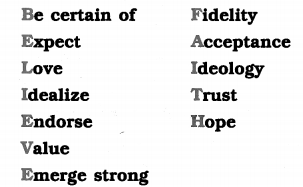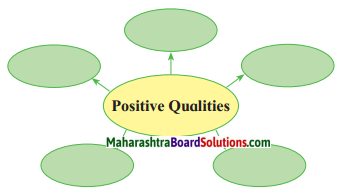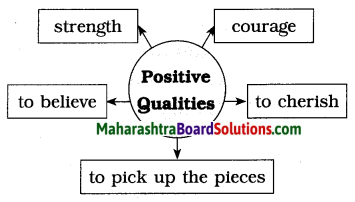Balbharti Maharashtra State Board Class 8 English Solutions Chapter 4.2 Revolutionary Steps in Surgery Notes, Textbook Exercise Important Questions, and Answers.
Maharashtra State Board Class 8 English Solutions Chapter 4.2 Revolutionary Steps in Surgery
Class 8 English Chapter 4.2 Revolutionary Steps in Surgery Textbook Questions and Answers
Warming Up
1. Discuss in your class:
Question 1.
Do you like to study science?
Answer:
(Points: yes, no, the reasons why)
Question 2.
What are the advantages of learning science?
Answer:
(Points: knowledge, information- more career opportunities, etc.)
![]()
Question 3.
Are robots truly useful to human beings?
Answer:
(Points: yes, no, why – examples of robots you have read of, seen in movies, etc.)
Question 4.
How can we take the help of robots in our daily life?
Answer:
(Points: household chores – boring,monotonous work – heavy manual jobs very intricate, minute jobs – dangerous; jobs – operations, surgeries, etc.)
Question 5.
Name some gadgets and: appliances we use in day-to-day life.
Answer:
(Points: washing machine, mixer, grinder, gas stoves, TV, dishwasher, heaters, etc.)
2. Imagine that one of your family members I friends I classmates has recently undergone a surgery. You were curious and wanted to learn about his/her experience.
Match the questions you asked with their answers.
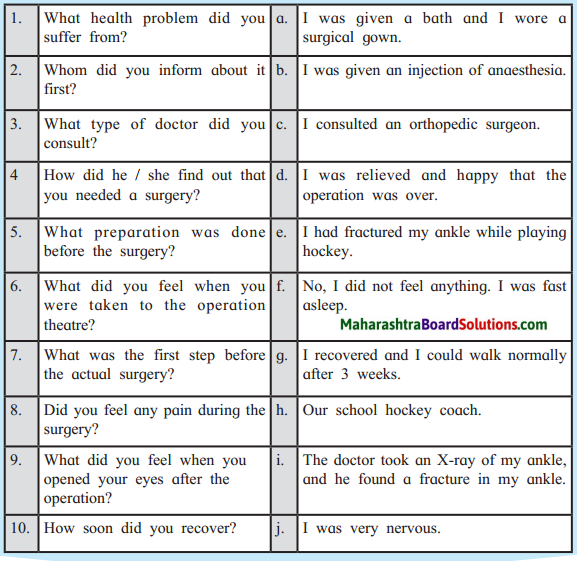
Question 1.
What health problem did you suffer from?
Answer:
I had fractured my ankle while playing hockey.
Question 2.
Whom did you Inform about It first?
Answer:
Our school hockey coach.
![]()
Question 3.
What type of doctor did you consult?
Answer:
I consulted an orthopedic surgeon.
Question 4.
How did he/she find out that you needed surgery?
Answer:
The doctor took an X-ray of my ankle, and he found a fracture In my ankle.
Question 5.
What preparation was done before the surgery?
Answer:
I was given a bath and I wore a surgical gown.
Question 6.
How did you feel when you were taken to the operation theatre?
Answer:
I was very nervous.
Question 7.
What was the first step before the actual surgery?
Answer:
I was given an injection of anesthesia.
Question 8.
Did you feel any pain during the surgery?
Answer:
No, I did not feel anything. I was fast asleep.
![]()
Question 9.
What did you feel when you opened your eyes after the operation?
Answer:
I was relieved and happy that the operation was over.
Question 10.
How soon did you recover?
Answer:
I recovered and I could walk normally after three weeks.
3. We have learned that sentences may have two, three or more sets of subject + predicate, joined by a conjunction. Each set of subject and predicate.
that is a part of a larger sentence is culled clause.
Separate the clauses in the following sentences and write the conjunction.
Question 1.
The thief stole the money and he ran away.
Answer:
Clause (i): The thief stole the money.
Clause (ii): he ran away
Conjunction: and
Question 2.
She told me that she was a doctor.
Answer:
Clause (i): She told me
Clause (ii): that she was a doctor
Conjunction: that
Question 3.
He ran fast but he did not win the race.
Answer:
Clause (i): He ran fast
Clause (ii): he did not win the race
Conjunction: but
Question 4.
The traveller arrived at the station after the train had left.
Answer:
Clause (i): The traveller arrived at the station
Clause (ii): after the train had left
Conjunction: after
4. Coordination
Observe the clauses in the following sentences.
(1) He is intelligent and he is hardworking.
(2) Asit was tired but he could not rest.
(3) You can go for a walk or you can exercise at home.
(4) Seerna has recovered from fever, so she can attend school.
Each of the above sentences have clauses which do not depend on each other for complete sense. They are called Independant or Co-ordinate clauses. They are joined by conjunctions like and, but, o, so. Such conjunctions are called Co-ordinators.
Other Co-ordinators are:
- as well as / not only but also
- yet / still I however / nevertheless
- or / nor / else / either or / neither nor
- so / therefore / thus / hence / for
From the sentences given in Activity 2 pick out two sentences having Co-ordinate Clauses. Point out the Co-ordinators:
Question 1.
I was given a bath and I wore a surgical gown.
Answer:
Coordinate Clause (i): I was given a bath.
Coordinate Clause (ii): I wore a surgical gown.
Conjunction: and
![]()
Question 2.
The doctor took an X-ray of my ankle and he found a fracture in my ankle.
Answer:
Coordinate Clause (i): The doctor took an X-ray of my ankle.
Coordinate Clause (ii): He found a fracture in my ankle.
Conjunction: and
1. Read the lesson and name the following:
Question a.
First surgeon to perform operations
Answer:
Sushruta
Question b.
Anaesthetics used from mid 19th century
Answer:
Ether and chloroform
Question c.
First successful Cardiac Surgeon
Answer:
Dr. Williams
Question d.
A sack around the heart
Answer:
pericardium
Question e.
Father of modern neurosurgery
Answer:
Harvey Cushing
Question f.
World’s most advanced surgical robot
Answer:
the Da Vinci.
![]()
2. Match the terms in ‘A’ with their explanation in ‘B’:
Question 1.
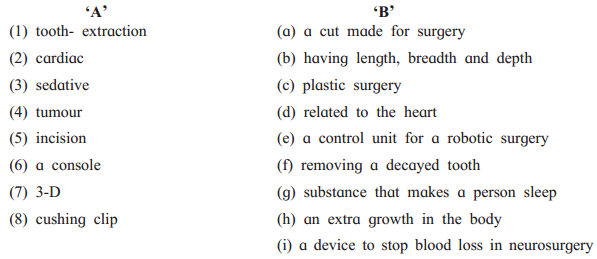
Answer:
(1) – (f).
(2) – (d).
(3) – (g).
(4) – (h).
(5) – (a).
(6) – (e).
(7) – (b).
(8) – (i).
3. Fill in the web with words related to ‘Surgery’:

Answer:
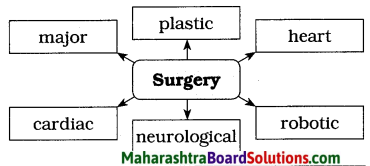
4. Write 3 to 4 lines about each of the following in your own words:
Question a.
Sushruta Samhita
Answer:
It is thought that Sushruta was probably the first surgeon to perform surgical operations, and the Sushruta Samhita is one of the oldest works In the world that deal with surgery.
![]()
Question b.
First Cardiac Surgery
Answer:
The first cardiac surgery was done by Dr Williams. A patient, James Cornish. was suffering from a very serious knife wound, and the knife had cut an artery less than an inch from his heart. It had punctured the pcricardium. Dr Williams and six staff doctors performed a complicated and daring operation and repaired the heart. This became the first successful cardiac surgery.
Question c.
First Neurosurgeon
Answer:
Harvey Cushing was the first neurosurgeon and is considered to be the father of modern neurological surgery. In the early part of the 20g” century, he developed basic techniques and instruments for operating on the brain. Cushing reduced the mortality rate for neurosurgery from 90% to less than 10%. By 1937, when he retired, he had successfully removed more than 2000 tumours. One of his most significant achievements was the development of a method to stem blood loss by inventing a clip called the ‘silver clip’ or the ‘Cushing clip’.
Question d.
The Robotic Surgery
Answer:
Robotic surgery is a type of minimal invasive surgery. Use Is made of miniature surgical Instruments, that fit through quarter-inch Incisions. Robotic surgery gives the surgeon a 3-D view of the operating site. Every movement he makes with the master controls Is replicated accurately by the robot. When necessary. the surgeon can even change the scale of the robot’s movements. Surgeons can use this technology to perform complex surgical procedures.
5. A. Fill in the gap in the table of Degrees of Comparison:
| (1) old | ||
| (2) healthy | ||
| (3) near | ||
| (4) fine | ||
| (5) ancient |
Answer:
| (1) old | older | oldest |
| (2) healthy | healthier | healthiest |
| (3) near | nearer | nearest |
| (4) fine | finer | finest |
| (5) ancient | more ancient | most ancient |
![]()
5. B. Adjectives which have more than two syllables (long words) take more and most before them to form Comparative and Superlative degrees:
For example : successful – Positive Degree
more successful – Comparative Degree
most successful – Superlative Degree
Give the Comparative and Superlative forms of:
| Positive Degree | Comparative Degree | Superlative degree |
| (1) | Oldest | |
| (2) | Healthier | |
| (3) Near | ||
| (4) | Finer | |
| (5) | Earliest | |
| (6) Small | ||
| (7) | Faster | |
| (8) High |
Answer:
| Positive Degree | Comparative Degree | Superlative degree |
| (1) Old | Older | Oldest |
| (2) Health | Healthier | Healthiest |
| (3) Near | Nearer | Nearest |
| (4) Fine | Finer | Finest |
| (5) Early | Earlier | Earliest |
| (6) Small | Smaller | Smallest |
| (7) Fast | Faster | Fastest |
| (8) High | Higher | Highest |
6. Join the sentences using appropriate Co-ordinators. (but, or, so, and):
Question a.
There was lack of technology. Major surgery could not develop for centuries.
Answer:
There was lack of technology,so Major surgery could not develop for centuries.
Question b.
Cardiac Surgery was tried in the past. Patients did not survive.
Answer:
Cardiac Surgery was tried in the past butPatients did not survive.
![]()
Question c.
He places his fingers into the master controls. He operates all four arms of the Da vinci.
Answer:
He places his fingers into the master controls and He operates all four arms of the Da vinci.
Question d.
Open heart surgery can help to repair heart valves. It can also replace them.
Answer:
Open heart surgery can help to repair heart valves or It can also replace them.
Question e.
Heart patients were treated with sedatives. They did not survive.
Answer:
Heart patients were treated with sedatives but They did not survive.
Question f.
These procedures can be performed through very small incisions. Our patients experience a number of benefits.
Answer:
These procedures can be performed through very small incisions so Our patients experience a number of benefits.
7. Write in your notebook an imaginary telephonic conversation between you and your family – secretary, asking for an appointment to consult the doctor for a health problem you are suffering from. Begin with
Secretary: Good morning! This is XYZ Clinic. How can I help you?
Myself: Good morning! I am
(Now continue……)
Class 8 English Chapter 4.2 Revolutionary Steps in Surgery Additional Important Questions and Answers
Write if the following statements True or False:
Question 1.
General anaesthesia makes the whole body numb.
Answer:
True
Question 2.
Daniel Williams was a young African American surgeon.
Answer:
True
![]()
Question 3.
Cardiac surgery was unknown after 1893.
Answer:
False
Question 4.
Cardiac surgery relates to the nerves and brain.
Answer:
False
Give reasons:
Question 1.
Doctors began to use anesthesia:
Answer:
Doctors could not cut open the part of the body that was not healthy to remove or set right the part, for this would involve a lot of pain to the patient. Hence, doctors began to use general or local anaesthesia, which benumbs the whole body or part of the body. After this, the surgery could be done without pain to the patient.
Question 2.
Cardiac surgery had not developed:
Answer:
Cardiac surgery had not developed because doctors did not have modern medical tools and procedures essential for heart surgery.
Activities based on Contextual Grammar:
Question 1.
Daniel Williams attempted a new medical technique in order to save a patient’s life.
(Pick out the subject and predicate.)
Answer:
subject – Daniel Williams
predicate – attempted a new medical technique in order to save a patient’s life
Question 2.
Sushruta was the first surgeon to perform surgical operations.
(Rewrite as a negative sentence.)
Answer:
No other surgeon had performed surgical operations before Sushruta.
![]()
Personal Response:
Question 1.
How do you feel when you are sick and have to go to a doctor?
Answer:
When I am sick and have to go to a doctor, I usually feel a little frightened that he may give me an injection or ask me to have a blood test. I also feel afraid that he may put me on a strict diet.
Name the following:
Question 1.
First successful Cardiac Surgeon:
Answer:
Dr. Williams
Question 2.
A sack around the heart:
Answer:
pericardium
Question 3.
Father of modern neurosurgery:
Answer:
Harvey Cushing
Question 4.
He was suffering from very serious knife wound:
Answer:
James Cornish
Answer the following:
Question 1.
Describe what kind of cardiac surgery is done nowadays.
Answer:
Nowadays, more advanced techniques are used to deal with heart complications. Open heart surgery, which helps to repair heart defects and heart valves and even replace them, is also performed successfully.
Question 2.
Explain who neurosurgeons operate upon and on what body parts.
Answer:
Neurosurgeons treat those who have disorders of the nervous system.
They can treat patients of all ages, from the newborn to the elderly, who have suffered a stroke. They operate on the brain, the spine, or the nerves.
![]()
Pick out the main clause and the subordinate clause in the following sentences:
Question 1.
Open heart surgery, which can help to repair heart defects, is also performed successfully.
Answer:
main clause: Open heart surgery is also performed successfully
subordinate clause: which can help to repair heart defects
Question 2.
They can treat patients of all ages who have suffered a stroke.
Answer:
main clause: They can treat patients of all ages.
subordinate clause: who have suffered a stroke
Personal Response:
Question 1.
Name a scientist whom you admire and say why you admire him/her.
Answer:
I admire the scientist Thomas Alva: Edison. He was an American inventor who has been described as America’s greatest inventor. He developed many devices that have greatly influenced our lives, including the phonograph, the motion picture camera, and the long-lasting electric light bulb.
![]()
Complete the following:
Question 1.
Da Vinci is the word’s ______.
Answer:
most advanced surgical robot
Question 2.
The Da Vinci’s miniaturized instruments are mounted on ______.
Answer:
three separate robotic arms
Question 3.
The surgeon controls the instruments from a ______.
Answer:
console located in the operating room
List the advantages of robotic surgery.
Answer:
The advantages of robotic surgery:
- Instead of operating on patients through large incisions, use is made of miniature surgical instruments, that fit through quarter inch incisions.
- Robotic surgery gives the surgeon a 3-D view of the operating site.
- Every movement the surgeon makes with the master controls is replicated accurately by the robot.
- When necessary, the surgeon can even change the scale of the robot’s movements.
- Surgeons can use this technology to perform complex surgical procedures.
- Since the incisions made are very small, the patients too benefit.
Activities based on Contextual Grammar:
Question 1.
Our surgeons are able to perform a growing number of complex surgical procedures. (Pick out the non-Jlnite verbs and say what they are.)
Answer:
to perform – Infinitive;
growing – present participle
![]()
Question 2.
The surgeon controls these instruments and the camera from a console, located in the operating room.
(Pick out the prepositions.)
Answer:
from
Personal Response:
What are the qualities needed to be a doctor?
Answer:
To be a doctor, one must be very sincere, intelligent, hardworking and dedicated. A doctor must be prepared to work odd hours. He must be strong- minded and ready to face people who are in pain and distress, and who may be facing death. Finally, last but not the least, the main aim of a doctor should be to cure people. Money should be secondary.
Do as directed:
Question 1.
Complete the word chain of 5 nouns:
surgery → …….. → ………. → ……… →
Answer:
surgery → youth → happiness → strength → health
Question 2.
Pick out the antonyms of the following words from those given in brackets:
simple, increased (successful, complicated, reduced, invasive, separate)
Answer:
simple x complicated
increased x reduced
Question 3.
Arrange the following words in alphabetical order:
dramatically, mortality, disorders,magnified.
Answer:
disorders, dramatically, magnified, mortality.
